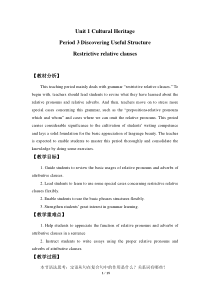 DOC
DOC
【文档说明】人教版(2019)英语必修第二册《Unit 1 Cultural Heritage》全单元教案.docx,共(15)页,899.728 KB,由小喜鸽上传
转载请保留链接:https://www.ichengzhen.cn/view-118970.html
以下为本文档部分文字说明:
1/15Unit1CulturalHeritagePeriod3DiscoveringUsefulStructureRestrictiverelativeclauses【教材分析】Thisteachingperiodmainlydealswit
hgrammar“restrictiverelativeclauses.”Tobeginwith,teachersshouldleadstudentstorevisewhattheyhavelearned
abouttherelativepronounsandrelativeadverbs.Andthen,teachersmoveontostressmorespecialcasesconcerningthisgrammar,suchasthe“prepositi
on+relativepronounswhichandwhom”andcaseswherewecanomittherelativepronouns.Thisperiodcarriesconsiderablesignificancetothecultivationo
fstudents’writingcompetenceandlaysasolidfoundationforthebasicappreciationoflanguagebeauty.Theteacherisexpectedtoenablestudentstomasterthispe
riodthoroughlyandconsolidatetheknowledgebydoingsomeexercises.【教学目标】1.Guidestudentstoreviewthebasicusagesofrelative
pronounsandadverbsofattributiveclauses.2.Leadstudentstolearntousesomespecialcasesconcerningrestrictiverelativeclausesflexibly.2.Enablestudentstouse
thebasicphrasesstructuresflexibly.3.Strengthenstudents’greatinterestingrammarlearning.【教学重难点】1.Helpstudentstoappreciatethefunction
ofrelativepronounsandadverbsofattributiveclausesinasentence2.Instructstudentstowriteessaysusingtheproperre
lativepronounsandadverbsofattributiveclauses.【教学过程】本节语法思考:定语从句在复合句中的作用是什么?关系词有哪些?2/15定语从句在复合句中的作用相当于形容词,它在句中作定语修饰名
词或代词。他们在先行词和定语从句之间起到联系作用,同时在意义上代表先行词并在定语从句中担任一个成分。被定语从句所修饰的词称先行词,定语从句一般放在先行词的后面。引导定语从句的关联词称为关系代词和关系副词。关系代词有who,whom,whose,that,which和as,关
系副词有when,where和why。Step1:巩固复习限定性定语从句基本用法。一、定语从句关系代词用法:1.定语从句中关系代词的选用主要由先行词决定。2.当先行词是表示人的名词或代词时,关系代词一般用who;that;whom;that;3.当先行词是表示事物的名词或
代词时,关系代词一般用which;that;whose;as;4.当先行词既有表示事物的名词或代词,又有表示人的名词或代词时,关系代词一般用that.5.whose用作关系代词时,它表示“……的……;事物(包括动物)”,whose引导定语从句时,其先行
词可以是指人的名词,其实也可以是指物的名词。二、关系副词的用法:如果先行词是指代“时间的名词”,还原到定语从句中作时间状语,则用关系副词when;如果先行词是指代“地点的名词”,还原到定语从句中作地点状语
,则用关系副词where;如果先行词是指代“原因的名词(reason)”,还原到定语从句中用作原因状语,则用关系副词why。Step2:限制性定语从句几种特殊情况。一、定语从句中介词+关系代词用法当关系代词在定语从句中作介词的宾语时,我们通常用“介词+关系代词”引导定语从句。关系
代词只能用which或whom。先行词指物时,用which;先行词指人时,用whom。在这个结构中,介词的确定的原则是:1.依据定语从句中动词或形容词等所需要的某种习惯搭配来确定。Heisthemanonwhomyoucanrely.他是你可以信赖的人。Jackintroduc
edtomehisfriendwithwhomIwasnotveryfamiliar.杰克向我介绍了我不很熟悉的那个朋友。2.依据与先行词搭配的具体意义而定。3/15I’llneverforgetthedayonwhichweworkedtogetherintheco
untryside.我不会忘记我们一起在乡下工作的日子。3.根据所表达的意思来确定。Thecleverboymadeaholeinthewall,throughwhichwecouldseewhatwashappeninginside
thehouse.这个聪明的孩子在墙上挖了一个洞,透过它我们可以看到屋里发生的事情。4.表示“所有”关系或“整体中的一部分”时,通常用介词of。JuliewasgoodatGerman,FrenchandRussian,allofwhichshespoke
fluently.朱丽亚擅长德语、法语和俄语,这三样她都说得流利。5.在定语从句中,有一些含介词的动词短语不可拆开使用,如lookafter,lookfor等。Thebabieswhomthenursesarelookingafterareveryhealthy.(正确)Thebabiesa
fterwhomthenursesarelookingareveryhealthy.(错误)二、介词+关系代词常见句型:1.“代词+of+which/whom”引导非限制性定语从句。这个结构中,代词常常为all,each,one,many,much
,most,some,none,both等,“代词+of+which/whom”通常在定语从句中用作主语,说明整体中的一部分。有时候也可把“of+which/whom”置于代词前。Itisreportedth
attwoschools,bothofwhicharebeingbuiltinmyhometown,willopennextyear.据报道,在我的家乡两所学校都正在建设中,将于明年投入使用。2.“数词+of+whic
h/whom”引导定语从句这种结构常用来引导非限制性定语从句,有时候也可以把“of+which/whom”置于数词前。3.“the+名词+ofwhich/whom”引导非限制性定语从句这个结构中,ofwhich/whom充当定语,修饰前面的名词,整
个结构相当于“whose+名词”引导的定语从句。4.“the+形容词比较级(最高级)+of+which/whom”引导非限制性定语从句。Therearetwobuildings,thelargerofwhichstandsnearlyahundredfeetheight.这儿
有两座建筑物,较大的那一座几乎有100英尺高。三、限制性定语从句中,关系词可以省略的几种情况。4/151.定语从句的先行词在定语从句中作宾语时,关系词通常省略。Ihavetakenwithmethetwobooks(that/which)youaskedmetoreturntotheCit
yLibrary.我把你要我送还给市图书馆的那两本书带走了。2.先行词是way,reason,time,place等且它们在定语从句中分别作方式、原因、时间和地点状语时,其后定语从句的相应关系词that/i
nwhich,why/that,when,where等可以省略。Theway(that/inwhich)youlookattheproblemiswrong.你看待问题的方式是错误的。3.由and,but,or等并列连词连
接两个或两个以上的定语从句修饰同一个先行词时,第一个关系词可以省略,但第二、三个一般不可以省略。Thereason(why/that)hewantedtosellhishousewasthatheneededalotofmoneyforhisoperation.
他想卖掉房子的原因是他的手术需要很多钱。【作业布置】填入适当的“介词+关系代词”使句意完整。1.Heistheman_______________youcanrely.他是你可以信赖的人。2.Jackintroduc
edtomehisfriend_______________Iwasnotveryfamiliar.杰克向我介绍了我不很熟悉的那个朋友。3.I’llneverforgettheday______________
_weworkedtogetherinthecountryside.4.我不会忘记我们一起在乡下工作的日子。Thecleverboymadeaholeinthewall,_______________wecouldseewhatwashappeninginsidethehouse.这个聪明的孩子在
墙上挖了一个洞,透过它我们可以看到屋里发生的事情。Unit1CulturalHeritage5/15Period1ListeningandSpeaking&ListeningandTalking【教材分析】ListeningandSpe
akingintroducesthetopicof“Takepartinayouthproject”.Thelisteningtextisaninterviewaboutaninternationalyouthculturalheritageprotectionproje
ct.Morethan20highschoolstudentsfromsevencountriesparticipatedintheproject.ThereporterinterviewedtwoparticipantsStephanieandLiuBin.By
listeningtothetext,studentscanunderstandthesignificanceofculturalheritageprotection,andteenagerscanus
etheirknowledge,combinetheirowninterestsandadvantages,etc.toparticipateintheactionofculturalheritageprotection.Liste
ningandTalkingintroducesthethemeof“Talkabouthistoryandculture”.ThelisteningtextisadialoguebetweentwotouristsandtourguideswhentheyvisittheKremlin,
RedSquareandsurroundingbuildings.Thedialoguefocusesonthefunctionalitemsof“startingaconversation”,whichisusedtopolitelyandappropriate
lyattracttheattentionoftheothers,soastosmoothlystartaconversationorstartanewtopic.Thepurposeofthissectioni
stoguidestudentstounderstandthehistoryandcurrentsituationofChineseandforeignculturalheritageintheirown
tourismexperiencesorfromotherpeople’stourismexperiences,explorethehistoricalandculturalvalues,andbeabl
etoexpressaccuratelyandappropriatelyinoralcommunication.【教学目标】1.Guidestudentstounderstandthecontentoflisteni
ngtextsintermsofthewholeandkeydetails;2.Cultivatestudents’abilitytoguessthemeaningofwordsinlistening;discusswiththeirpeershowtoparticipat
einculturalheritageprotectionactivities.3.Instructstudentstousefunctionalsentencesofthedialoguesuchas“Ibegyourpardon,but…”“Forgivemeforaski
ng,but…”andsoontostartthe6/15conversationmorepolitelyandappropriately.【教学重难点】1.Guidestudentstounderstandthecontentoflistening
textsintermsofthewholeandkeydetails;2.Cultivatestudents’abilitytoguessthemeaningofwordsinlistening;discusswiththeirpeer
showtoparticipateinculturalheritageprotectionactivities.3.Enablestudentstousethefunctionalitemsof“startingaconvers
ation”,whichisusedtosmoothlystartaconversationorstartanewtopic.【教学过程】Part1:ListeningandSpeakingStep1:LeadinTheteacherisad
visedtotalkaboutthemeaningoftheword“Heritage”.Boysandgirls,beforeourlistening,let’sworkinpairsanddiscussthemeaningoftheword“Heritag
e”.Whatdoestheword“heritage”mean?Shareyourideasaboutyourunderstandingofitandyoucanuseexamplestoillustrateyo
urmeaning.Heritagemeansthetraditionalbeliefs,values,customs,etc.ofafamily,countryorsociety.Forexample,theGreatWallistheheritageofChina.S
tep2:PredictionAftertheirsmalltalk,theteachercanaskstudentstopredictwhatthelisteningtextisaboutbylookingatthepictures.Thelisteningtextisprobably
abouthowtoprotectafamousheritagesitebysomestudents.Step3:Summaryofthemainidea7/15Thenplaytheradiowhichisaboutaninterviewaboutaninternationalyout
hculturalheritageprotectionproject.Andafterfinishinglisteningforthefirsttime,thestudentsneedtosolvethefollowingtasks.1.Listentotheconversationandsu
mupthemainidea.YouthsfromsevencountriesareworkingtogethertoprotectculturalrelicsonMountTai.2.Listenagainandhelpthereportertocompletetheinterviewnote
s.Internationalyouthproject,23highschoolstudentsfrom7countriesMountTai,oneofthemostfamousmountainsinChinaIthasbeenprotected
formorethan3,000years.22temples,around1,800stoneswithwritingonthemDaiTempleonMountTai;over6,000stepsListeningtip:Usecontexttogues
swordsToguessthemeaningofnewwords,lookattheotherwordsandusewhatyouknowaboutthetopic.Step4:Guessingthemeaningoftheunk
nownwordsListentotheconversationagainandusethecontexttoguessthemeaningofthewordsbelow.Tellthereasonswhyyouguessso.Preserve:toprotectReas
on:thewordmeansthesameofawordIknowPromote:tohelpsthtohappenordevelopReason:ThewordisexplainedbythespeakerStep5
:SpeakingProjectWorkinpairsorgroupsandroleplayaconversation.Supposeyouareareporterandinterviewingthestudentswhodevotetheirtimetoprotectingtheheritage
.Reporter:ItissaidthatyouareoneofthevolunteerstopreservethepinetreesonMountHuang.Whatareyouguysdoing?Volunteer:Wearemakingsomesignswhicharedesigned
toeducatepeopletoprotectthepinetrees.8/15Volunteer:Besides,wetookalotofpicturesofpinetreesandcreateanappwhichaimstopromotepeople’sawarenessofp
rotectingtheprecioustrees.Reporter:Soundsgreatandanythingelse?Volunteer:Weoftenwearvolunteerclothesandsendsomebrochuresintheparktocallonmor
epeopletoprotectthetrees.Reporter:Doesyourhardworkpayoff?Volunteer:Definitely.Moreandmoretouristsarenowstoppingcarvingnamesonthetreesorclimb
ingthetrees.Part2:ListeningandTalkingStep1:Listentothetape,whichisaboutadialoguebetweentwotouristsandatou
rguidewhentheyvisittheKremlin,RedSquareandsurroundingbuildingsforthefirsttime,andthenaskthestudentstosolvethefollowingtas
ks.1.Listentotheconversationandanswer(1).Wherearethespeakers?Onastreet.(2).Whataretheydoing?Sightseeing.2.Whatdoyouknowab
outtheKremlinandRedSquare?Listenagainandcompletethefactsheet.Step2:SpeakingProjectActivity3onpage7.Workingroups.Chooseaculturalsitet
hatyoulikeandrole-playaconversationbetweensometouristsandtheirtourguide.Taketurnstoplaythedifferentrol
es.9/15Step3HomeworkAccordingtoActivity3,writedownaconversationbetweenthetouristandhis/herguide.Unit1CulturalHeritagePeriod2ReadingandTh
inking:FromProblemstoSolutions【教材分析】1.Thissectionfocuseson“Understandinghowaproblemwassolved”,whichisaimedtoguidestudentstoa
nalyzeanddiscussthechallengesandproblemsfacedbyculturalheritageprotectionduringtheconstructionofAswanDam,aswellasth
esolutions.Onthebasisofunderstanding,studentsshouldpayattentiontothekeyroleofinternationalcooperationinsolvi
ngproblems,andattachimportancetothebalanceandcoordinationbetweenculturalheritageprotectionandsocialandeconomicdevelopment.Studentsareencourage
dtofacechallengesactively,begoodatcooperation,andmakecontinuouseffortstofindreasonablewaysandmeanstosolveproblems.【教学
目标】1.Enablestudentstounderstandthemaininformationandtextstructureofthereadingtext;2.Motivatestudentstousethereadingst
rategy“makeatimeline”accordingtotheappropriatetextgenre;3.Enablestudentstounderstandhowaproblemwassolved;4.Enablestudentstounderstandthevalueof
protectingculturalheritagebyteamworkandglobalcommunity;【教学重难点】1.Guidestudentstopayattentiontoreadingstrategies,su
chasprediction,self-questioningandscanning.10/152.Helpstudentssortoutthetopiclanguageaboutprotectingculturalre
licsandunderstandthenarrativecharacteristicsof“time-event”inillustrativestyle3.Leadstudentstounderstandthev
alueofprotectingculturalheritagebyteamworkandglobalcommunity;【教学过程】1.PredictionStep1PredictingthemainideaofthepassageLook
atthetitleandthepictures,andthenpredictwhatthepassagewillbeabout.Q:Whatwillbetalkedabout?Step2:FastreadingtasksTaskofthefirstfastreading:Re
adquicklyandfigureoutthekeywordsofeachparagraph.•Paragraph1:challenge•Paragraph2:proposalledtoprotests•Paragraph3:commit
teeestablished•Paragraph4:broughttogether•Paragraph5:success•Paragraph6:spiritTaskofthesecondfastreading:1.WhydidtheEgyptiangovernment
wanttobuildanewdaminthe1950s?2.Whydidthebuildingofthedamleadtoprotests?3.Howdidthegovernmentsavethecul
turalrelics?4.Whichonecandescribetheproject?A.Successful.B.Negative.C.Useless.D.Doubtful.5.Whatcanbelear
nedfromtheAswanDamproject?Step3:CarefulreadingtasksReadmorecarefullyandanswerthefollowingquestions.1.Whatdo“problems”r
efertoandwhatdo“solutions”referto?2.Findoutthenumbersinparagraphfourandexplainwhytheauthorusedexactnumbersinsteadofexpressionslikemany?11/1
53.Whatcanyouinferfrom“Overthenext20years,thousandsofengineersandworkersrescued22templesandcountlesscultur
alrelics”?4.Whatcanyouinferfrom“Fiftycountriesdonatednearly80milliontotheproject”?Theprojectcostalotofmoney.5.Beforethebuildingofthedam
,whatproblemsdidtheNileRiverbringtotheEgyptian?6.Whatwordscanyouthinkoftodescribetheworkingprocessoftheproject?
Step4:ConsolidationDividethepassageintothreepartsandgetthemainideaofeachpart.Part1(Paragraph1)TheintroductionofthetopicKeep
ingtherightbalancebetweenprogressandtheprotectionofculturalsitesisabigchallenge.Part2(Paragraphs2-5)Theprocessofs
avingculturalrelics•Bigchallengescansometimesleadtogreatsolutions.•TheEgyptiangovernmentwantedtobuildanewdam,whichwoulddamagemanyculturalreli
cs.•ThegovernmentturnedtotheUNforhelp.•Expertsmadeaproposalforhowtosaveculturalrelicsafteralotofeffort
sandtheworkbegan.•Culturalrelicsweretakendownandmovedtoasafeplace.•Countlessculturalrelicswererescued.•The
projectwasasuccess.Part3(Paragraph6)ThesummaryofthetextTheglobalcommunitycansometimesprovideasolutiontoadifficultproblemforasinglenation.
Step5:Criticalthinking:1.Howtodealwiththeconstructionandtheprotectionofculturalrelics?12/152.Asstudents
,whatshouldwedotoprotectourculturalrelics?Step6:summaryTheoutlineofthepassageIntroducethetopic:Abigchallenge—the
balancebetweenprogressandtheprotectionofculturalsites.Listtheevidence:Inthe1950sthegovernmentwantedt
obuildanewdam.In1959,thegovernmentaskedtheUNforhelp.In1960,theprojectstarted/began.In1961thefirsttemplewasmoved.Overth
enexttwentyyears,thetemplesandculturalrelicswerebeingrescued.In1980,theprojectwascompleted/ended.ConclusionThespir
itoftheAswanDamprojectisstillalivetoday.Step7Homework:Reviewwhatwehavelearnedandfindoutthekeylanguagepointsinthetext.Unit1C
ULTURALHERITAGEReadingforWriting【教学目的与核心素养】1.Getstudentstohaveagoodunderstandingofsomefeaturesaboutanewsreportbyreadingthetext.2.
Instructstudentstowriteasummaryaboutanewsreportproperlyusingsomenewlyacquiredwritingskillsinthisperiod.3.Developstudents’writingandcooperatingabilit
ies.4.Strengthenstudents’greatinterestinwritingdiscourses.【教学重难点】1.Stimulatestudentstohaveagoodunderstandingofhowtoasumma
ryaboutanewsreport2.Cultivatestudentstowriteanewsreportproperlyandconcisely.13/15【教学过程】Step1LeadinDoyouthinkitisnecessaryforustocirculate
ourculturalheritagetotheworld?Whyorwhynot?Doweneedtolearnmoreaboutothercountries’culturalheritage?Whyorwhynot?Step2Readtodisc
overdetailsconcerningthemainbodyofthenewsreportReadthenewsreportandthensolvethequestionsbelow.1.Whatare
theresearchersandscientiststryingtodo?(TheresearchersandscientistsaretryingtoincreaseknowledgeandappreciationofChina’sancientcultural
heritage.)2.Whatmoderntechnologyaretheyusing?(Theyareusingdigitalphotographytorecordacollectionofimages.)3.Whyaresomanypeopleinterestedinthe
MogaoCaves?(PeopleareinterestedintheMogaoCavesbecausetheyhavelongbeenameetingpointfordifferentcultur
esandarepartofthehistoryofmanycountries.)4.Whatdoyouthinkoftheresearcher’sopinioninthelastparagraph?(I
agreewiththeresearcher’sopinion.Understandingourownandotherculturesisagreatwaytounderstandourselvesandothers.)HavetheSsdiscussthequestionsingroupsa
ndthensharetheiranswerstotheclass.Step3:Studytheorganizationandlanguagefeatures1.Readthenewsreportagainandfindtheseparts.A.LeadsentenceLanzh
ou,9August2017.AgroupofresearchersandscientistsfromChinaandothercountriesareworkingtogether...China’san
cientculturalheritage.B.Directquote“Appreciatingone’sownculturalheritageisveryimportantforunderstandingourselves.Appreciatingtheculturalherit
ageofothercountriesisveryimportantforinternationalcommunicationandunderstanding.”C.Paraphrase14/15Theyarerecordingandcollectingdigitalimageso
fculturalrelicsfromtheMogaoCaves,whichwereakeystopalongtheSilkRoadthroughoutChina’sancienthistory.Nearly500,000high-qualitydigitalphotograp
hshavebeenproducedsincetheinternationalprojectstartedin1994.D.BackgroundinformationTheMogaoCaveshavelongbeenameetingpointfordiff
erentculturesandarepartofthehistoryofmanycountries.E.ReportingverbsF.Wordstoshowcomparisonand/orcontrastToday,th
ecavesarejustasinteractionalastheywereatthetimewhenpeopletravelledtheSilkRoad.2.Underlinetherelativeclausesthatthewriterusestoi
dentifythefollowing.A.thingsTheyarerecordingandcollectingdigitalimagesofculturalrelicsfromtheMogaoCaves,whichwereakeystopalongtheSilkRoadthroughoutC
hina’sancienthistory.B.peopleAsoneresearcherwhoisworkingontheprojectexplains,“Appreciatingone’sownculturalhe
ritageisveryimportantforunderstandingourselves.Appreciatingtheculturalheritageofothercountriesisveryimportantfo
rinternationalcommunicationandunderstanding.”C.timeToday,thecavesarejustasinteractionalastheywereatthetimewhenpeopletravelledt
heSilkRoad.Step4Postreadingforfurthersummaryandunderstanding1.Whydoesthewriterusethequoteinthereport?Thewri
terusesquotesinordertomakethenewsreportmoreconcise,authenticandpersuasive.2.Explainyourunderstandingoft
hesentences:“Appreciatingone’sownculturalheritageisveryimportantforunderstandingourselves.Appreciatingthecu
lturalheritageofothercountriesisveryimportantforinternationalcommunicationand15/15understanding.”Weshouldlearnandunderstandourowncultu
res,whichisvitalforustoknowourselvesandbeproudofourprofoundandextensiveculturalheritage.Meanwhile,weshouldunderstandandappreciateotherculture
s,tryingtobeopen-minded.Thisway,wecandeepeneachother’sunderstandingandrespect.Step5HomeworkWriteanewsreportaboutL
iHuawhoworkstoprotectourculturalheritageusingthefollowingnotesandyoucanadddetailstomakethenewsreportmoreconciseanddetailed.▪Name:
LiHuaPlace:Xi’anProfession:aseniorhighschoolteacher▪wantstopreserveculturalheritage:▪protectoldhouses▪takesphotosofoldbuildings▪helpsrep
airbuildings▪looksforculturalrelics▪interviewsoldpeople▪showsculturalrelicstothepublic▪writesaboutthebuildings…
 辽公网安备 21102102000191号
辽公网安备 21102102000191号
 营业执照
营业执照